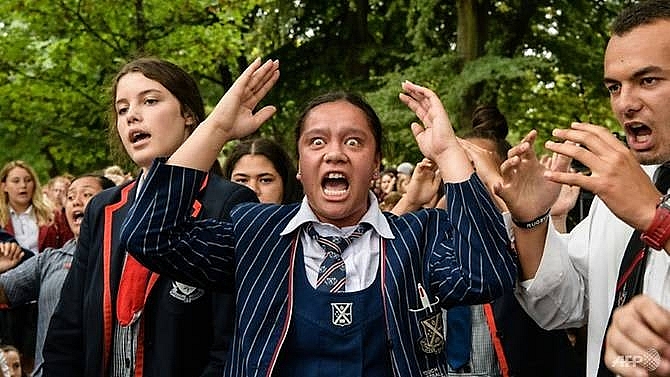'I Live! I Die!': New Zealand uses haka to heal after attacks
 |
| As the country struggles to respond to the horrific tragedy, it was perhaps inevitable that many would turn to the haka. (Photo: AFP/ANTHONY WALLACE) |
Kiwis ranging from heavily tattooed bikers to business executives, children and the elderly have lined up to perform the intimidating ceremonial dance which begins with fierce chants roughly translated as "I Live! I Die!"
As the country struggles to respond to the horrific tragedy, it was perhaps inevitable that many would turn to the haka - a dance whose origins lie with the indigenous Maori community but which has become a global symbol of New Zealand as the battle cry of its national rugby team, the All Blacks.
The aggressive ritual and threatening histrionics may seem out of step with the sombre atmosphere gripping the nation after Brenton Tarrant, a 28-year-old Australian and avowed white supremacist, allegedly gunned down 50 Muslims during prayers last Friday (Mar 15).
But the haka is not only meant to intimidate, but also to mourn, melding both hostility and beauty into an outpouring of true emotion, said Te Kahautu Maxwell, a professor of Maori at Waikato University.
"Haka is used for death and mourning. It is an integral part of the Maori mourning process. Haka is used to show love and compassion. Haka is used to uplift the spirits of bereaved families," Maxwell said.
With their eyes bulging while bellowing out the ritual's loud rallying cries, tattooed members of one of New Zealand's biggest criminal biker gangs joined with local children to channel that emotion through a haka for relatives of the dead gathered near Christchurch hospital this week.
GOD'S GIFT
Other haka performances have burst forth across Christchurch and elsewhere in the country as well as in Australia, where large communities of New Zealanders live.
The haka stirs strong emotions in shooting survivor Kawthar Abulaban.
She was in Christchurch's Al Noor mosque when the shooting erupted, eventually escaping through the back door.
In the days since, she has repeatedly watched videos of the haka performances staged in response to the massacre, welling up each time.
"Because you can feel it when you see them. You feel it, it touches your heart. Every time I see it I cry, it means too much," she said.
According to Maori legend, the haka originated at the beginning of time as a gift from Tanerore, the son of Tama-nuira, the sun god.
"Just as heat haze shimmers on a hot summer's day, in the haka all parts of the body shake from the crown to the soles of one's feet," Maxwell said, describing the intended meaning behind the dance's movements.
Lisa Tumahai, who heads the Ngai Tahu, the main Maori iwi, or tribe, on New Zealand's South Island, said it was a natural reaction by Kiwis looking to show support for their Muslim neighbours.
"No matter how angry or scared we are feeling at the moment, we must come together as one strong community to show care and compassion for those who made Aotearoa their home and who have now lost precious loved ones," she said.
Aotearoa, or "land of the long white cloud", is the Maori name for New Zealand.
'WE HAVE BEEN INVADED'
In a further show of solidarity, the New Zealand government invited a Muslim imam to intone the Koranic bismillah in praise of Allah at the opening of the parliamentary session on Tuesday.
New Zealand Prime Minister Jacinda Ardern followed up by saying "Wa alaikum salaam wa rahmatullahi wa barakatuh" - "May the peace, mercy, and blessings of Allah be with you too."
Schools, Maori tribes and sports teams will each have their own haka, and the version performed by the All Blacks, called "Ka mate, Ka mate", tells of a 19th-century warrior, Te Rauparaha, who hid in a food storage pit to escape his enemies.
The opening life-and-death chant reflects Te Rauparaha pondering his fate.
Maxwell said the haka reflected the overwhelming sadness following the massacre, as Kiwis grapple with the "fact we have been invaded and this terrible act has been committed on our shores."
Maxwell added that as Muslim victims came under fire last week, "you can imagine they were thinking 'am I going to live? am I going to die?'"
What the stars mean:
★ Poor ★ ★ Promising ★★★ Good ★★★★ Very good ★★★★★ Exceptional
Related Contents
Latest News
More News
- Foreign leaders extend congratulations to Party General Secretary To Lam (January 25, 2026 | 10:01)
- Russian President congratulates Vietnamese Party leader during phone talks (January 25, 2026 | 09:58)
- Worldwide congratulations underscore confidence in Vietnam’s 14th Party Congress (January 23, 2026 | 09:02)
- Political parties, organisations, int’l friends send congratulations to 14th National Party Congress (January 22, 2026 | 09:33)
- 14th National Party Congress: Japanese media highlight Vietnam’s growth targets (January 21, 2026 | 09:46)
- 14th National Party Congress: Driving force for Vietnam to continue renewal, innovation, breakthroughs (January 21, 2026 | 09:42)
- Vietnam remains spiritual support for progressive forces: Colombian party leader (January 21, 2026 | 08:00)
- Int'l media provides large coverage of 14th National Party Congress's first working day (January 20, 2026 | 09:09)
- Vietnamese firms win top honours at ASEAN Digital Awards (January 16, 2026 | 16:45)
- ASEAN Digital Ministers' Meeting opens in Hanoi (January 15, 2026 | 15:33)

 Tag:
Tag:
















 Mobile Version
Mobile Version